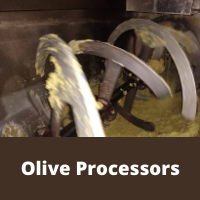A finding by a leading overseas olive oil taster that the majority of oils assessed during the recent Queensland Olive Exposium were faulty has sparked a search for Australian-specific sensory descriptions.
Dr Marco Mugelli, president of the National Association of Professional
Tasters of Olive Oil in Italy, assessed samples of olive oils from around the country and considered that most had defects and could not be classed extra virgin.
His findings have caused some concern in the industry and invited scrutiny on post harvesting and processing practices and methods. However, as well as coincidences to do with the sample there may also be some explanations for what he considers a high proportion of defected oils. One of them could reflect Australia’s environmental conditions which produce oils with distinct characteristics even to that of oil from the same olive varieties grown in other countries.
This results in what is known as terroir in the wine industry and what
olive author and industry identity Michael Burr would like to see referred
to as aurora for olive oil. Dr Rod Mailer is the head of the New South Wales Department of Primary Industries’ chemical testing laboratory and oversees the commercial testing of olive oil in Australia.
He says it may be that Australia needs its own descriptors in the sensory assessment of olive oils.
“We really do need some words that describe our oils and which could be submitted to the International Oil Council to widen the current definition.”
Australia’s panel of 25 internationally accredited olive oil tasters, headed by
Peter Olson, will be looking at this issue. Both Dr Mailer and Mr Olson do not believe that Australian olive oils have the high level of faults suggested by Dr
Mugelli.
They say that most of olive oils produced in Australia are of high quality and this is testified by the number which win international awards and are exported as extra virgin olive oils. Dr Mailer says that the comments and findings by Dr Mugelli may reflect a more critical approach by his group.
Alternatively he did not taste a good representative sample of Australian oils. However, he says Dr Mugelli is encouraging of developing appropriate ways of describing local oils and that his comments concerning attention to some processing methods deserve investigation.
In particular is a suggestion that defects could occur if the oil is not separated quickly enough from water and solids after processing. There is a view that allowing the water and oil to settle once they have been extracted allows enzymatic reactions to occur.
Dr Mugelli believes that the longer the oil is in contact with the water the more chance it has to produce ‘off’ flavours. Dr Mailer says that this may be possible given that it is known that the longer the harvested fruit is allowed to stand before processing, the more time enzymes can react with the oil and increase its free fatty acids.
“Dr Mugelli suggests that the oil should be immediately separated from the water and solids.
“The message from Dr Mugelli is that everyone should be trying to filter the oil as soon as possible after fruit extraction.”


